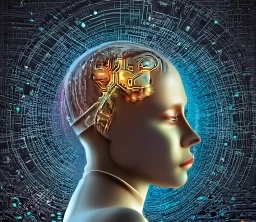Generative AI is indeed a significant concept within the field of Artificial Intelligence, especially in recent years with the advent of advanced generative models like Generative Adversarial Networks (GANs) and Variational Autoencoders (VAEs).
Generative AI
Generative AI refers to the subset of Artificial Intelligence focused on creating new content, such as images, text, music, and even videos. Unlike traditional AI models that are designed for specific tasks like classification or prediction, generative models have the remarkable ability to generate new data samples that mimic the characteristics of the training data.
Generative Adversarial Networks (GANs)
GANs consist of two neural networks — a generator and a discriminator — trained in tandem. The generator learns to generate synthetic data samples, while the discriminator learns to distinguish between real and fake data. Through iterative training, GANs produce increasingly realistic outputs, making them valuable for tasks like image synthesis, style transfer, and data augmentation.
Variational Autoencoders (VAEs)
VAEs are another class of generative models that learn to encode and decode high-dimensional data. VAEs learn a latent representation of the input data, allowing them to generate new samples by sampling from the learned latent space. VAEs have applications in image generation, anomaly detection, and data compression.
Text Generation
Generative AI has made significant strides in natural language generation, with models like OpenAI’s GPT (Generative Pre-trained Transformer) series. These models use large-scale training on text corpora to generate coherent and contextually relevant text. Applications include language translation, text summarization, and dialogue generation.
Art and Creativity
Generative AI has opened new frontiers in art and creativity, enabling artists and designers to explore novel forms of expression. AI-generated art, music, and literature challenge conventional notions of creativity and raise philosophical questions about the nature of authorship and originality.
Ethical Considerations
While generative AI offers exciting possibilities, it also raises ethical considerations, particularly concerning the authenticity and ownership of generated content. Questions about copyright, intellectual property rights, and the potential misuse of generative models underscore the need for ethical guidelines and responsible use of AI technologies.
Generative AI represents a fascinating intersection of creativity, technology, and human ingenuity.
As researchers continue to push the boundaries of generative models, we can expect to see further innovations in content creation, artistic expression, and the synthesis of new ideas and concepts.
By embracing generative AI responsibly, we can harness its transformative potential to enrich human experiences and inspire new forms of innovation and creativity.









